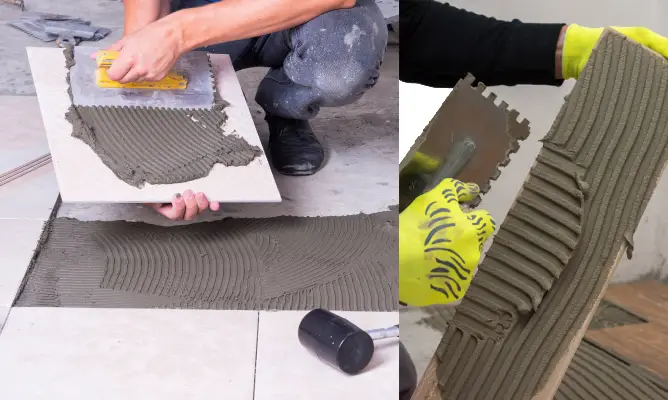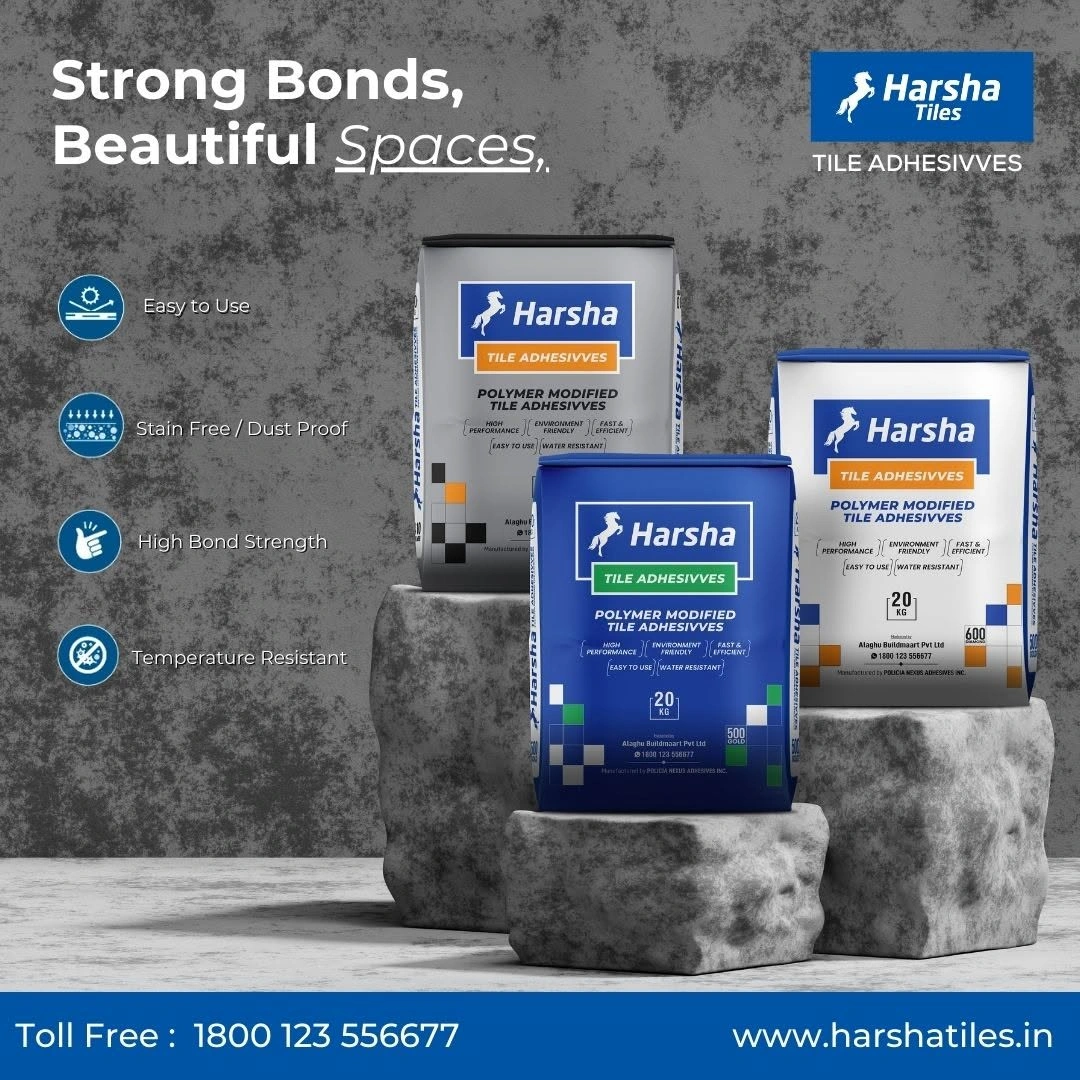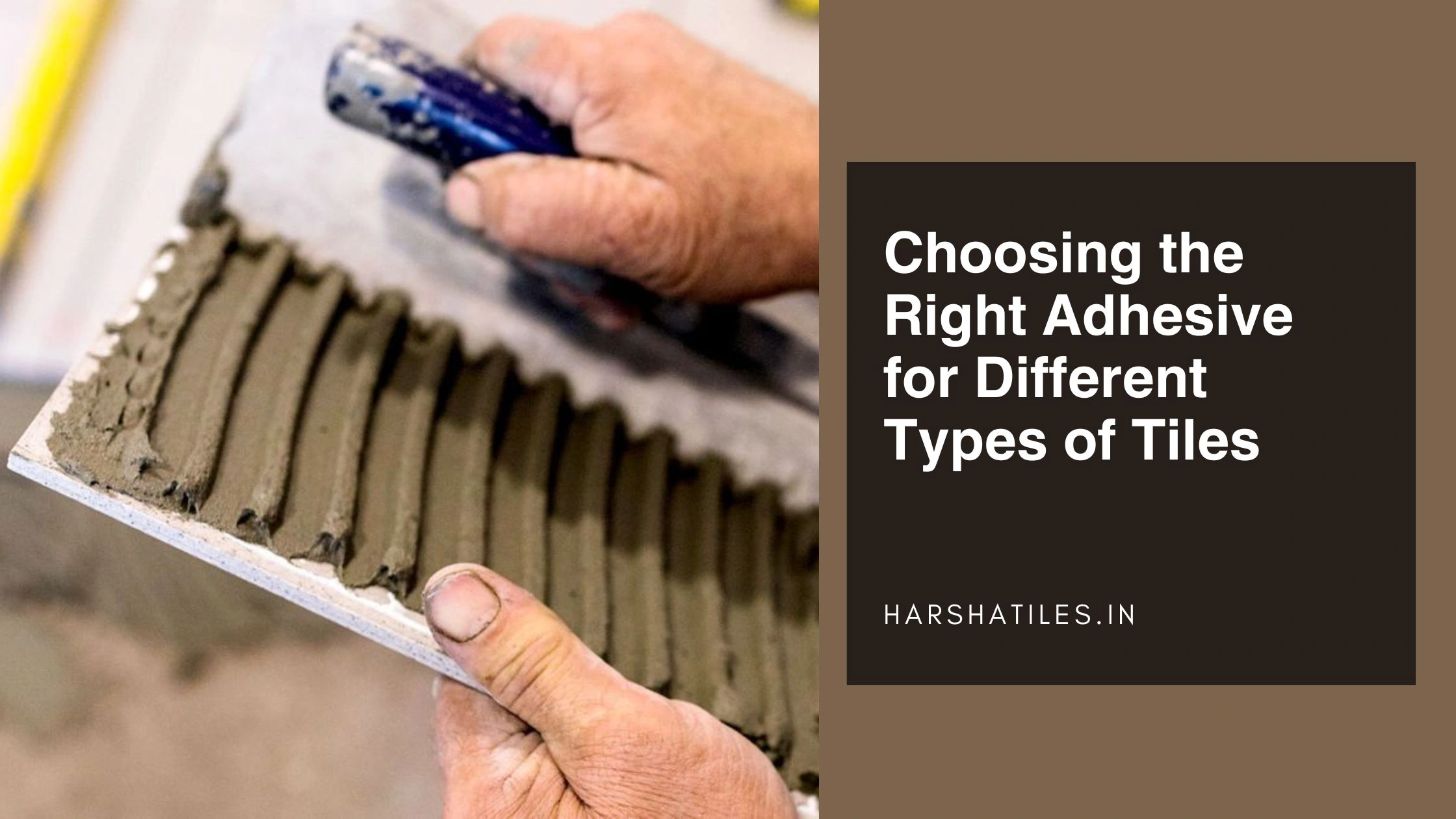Feb 05, 2026
Connect With Our Team
Choosing the Right Adhesive for Different Types of Tiles
- Home
- Utilities
- News & Blog
Choosing the right adhesive in tile installation is a very important point in order to ensure a solid bond with long-lasting results. Owing to the unique nature of every material, what needs to apply will be determined by the kind of tile and the environment of installment so that one avoids wasting time and effort and money for the long run. This article delves into different tile adhesives, considerations when choosing one, and its best options for various kinds of tiles.
Understanding Tile Adhesives
Tile adhesive is a bonding agent for tile fixing. Several adhesives are formulated for various tile materials, surfaces, or specific environmental conditions to offer maximum strength, durability, and water resistance where needed.
Types of Tile Adhesives
There are three general types of tile adhesives:
-
Cement-Based Adhesives: These are powder adhesives that require mixing with water. Such adhesives exhibit high strength and are usually used in areas with exposure to moisture.
-
Epoxy Adhesives: Epoxy adhesives are resistant to chemicals and water, making them ideal for wet locations and high-traffic spaces.
-
Organic Mastic Adhesives: Ready-to-use in paste form, these adhesives are suitable for small tiles in low-moisture applications, like kitchen backsplashes.
Things to Consider in Selecting Tile Adhesive
-
Tile Material: Some tile materials require different types of adhesives. Ceramic, porcelain, and the like require different kinds of glue compared to natural stones and glass.
-
Type of Surface or Substrate: The substrate, or surface upon which the tile is applied, affects the choice of adhesive. An adhesive may be required for installation on drywall that is different from cement board or plywood. Avoidance of troubles like tile settling or weak bonding can be ensured by compatibility with the substrate.
-
Environmental Conditions: Temperature and humidity, and moisture exposure have a role in adhesive selection. In outdoor or wet locations, a water-resistant adhesive is important; high-heat areas require a heat-resistant adhesive.
Specialized Tile Adhesives for Specific Applications
1. Ceramic Tiles
Ceramic tiles are very versatile and may be applied with most adhesives. Cement-based adhesives can be applied well with conventional ceramic tiles, especially where the areas consist of a great deal of moisture. Organic mastic is good for application on walls and backsplashes, because it is easy to apply.
2. Porcelain Tiles
Porcelain is denser and heavier than ceramic. Therefore, a strong adhesive is necessary. For porcelain tiles, a polymer-modified, cement-based adhesive is recommended because they have excellent bonding strength and water resistance and are advisable for wet areas.
3. Glass Tiles
Clear adhesives are also required in the use of glass tiles so not to cause visibility problems and keep the tile clean. For glass tiles, epoxy adhesives are recommended as they possess the property of being able to withstand exposure and being transparent, ideal for backsplashes and accent walls.
4. Natural Stone Tiles (Marble, Granite, etc.)
Natural stone tiles are heavy and porous, so they require a premium-quality adhesive. Epoxy adhesives and polymer-modified based adhesives work well, offering the strength needed for heavy stones. Be sure to choose an adhesive that won't discolor light-colored stones like marble.
5. Outdoor Tiles
Outdoor tile installations will be exposed to temperature shifts, moisture, and UV radiation. Seal yourself with a cement-based adhesive that is designed for outdoor installation that is typically termed "flexible" or "weather-resistant."
6. Adhesives for Wet Areas (Bathrooms, Kitchens, Pools)
For areas exposed to moisture, it becomes paramount to seal using waterproof adhesives like epoxy or specialized cement-based adhesives. Water cannot penetrate the surface through these adhesives so there won't be chances of mold or mildew due to wet conditions.
7. Heat-Resistant Adhesives for Fireplaces and Stoves
For a Fireplace and Stove When placing tiles around a fireplace or behind a stove, high heat exposure is expected. For this purpose, high heat-rated adhesives are to be used, as it would be important for the tiles not to loosen or crack with extreme heat.
Choosing Adhesives for Tile Size and Weight
-
Small and Medium Tiles: Standard-size tiles can often be applied with common cement-based or organic mastic adhesives, depending on the specific application. Ceramic is also often a good choice for mastic because it is lightweight.
-
Large Format Tiles: Large tiles are mostly heavier than the standard tiles and require high strength adhesive for avoiding slipping in position and for keeping the tiles as strong as possible. Thicker polymer-modified cement adhesive best suits it, and can take care of extra weight without shifting of wider grout lines.
How to Apply Tile Adhesive
-
Preparing Adhesive Mixture: Follow manufacturer instructions to mix cement-based or epoxy adhesives. Achieving the right consistency is crucial; the mixture should be neither too thick nor too runny. Properly mixed adhesive ensures even application and a strong bond.

-
Applying Adhesive Evenly: Scrabble the adhesive evenly across the substrate using a notched trowel. The size of the notch would vary with the size of the tile. For the larger tiles, they require bigger notches to fix them properly. Even application will avoid gaps and air pockets, which might weaken the bond.
-
Pressing and Setting Tile: Let it tile onto the adhesive, but press down so it is touching the adhesive. Shake the tile a little to remove any air trapped inside. Use spacers to maintain your grout lines evenly. Allow the adhesive to set as recommended by the manufacturer.
Common Mistakes Applying Tile Adhesive
-
Applying the wrong type of adhesive: Using an inappropriate adhesive may cause tiles to loosen or stain. Always use an adhesive appropriate for the type of tile material and environmental condition to ensure durability and cleanliness.

-
Failure to Allow Adequate Curing Time: Attempting to work on the adhesive too soon can result in poor adhesion. Follow the manufacturer's curing recommendations to allow the adhesive sufficient time to cure fully before introducing additional weight through grouting, for example.
-
Applying Too Much or Too Little Adhesive: Too much adhesive could leak between the tiles. Too little adhesive weakens the bond. Be constant in applying an amount that suits the tile size and type. Apply evenly without any mishaps on leveling or bonding.
Some Tips on Tiles and Adhesive Over Time
-
Sealing and Protecting Tiles: Some tile materials, especially natural stone, may need the sealant reapplied to keep the adhesive fresh and prevent water or stain penetration. Monitor the sealant and renew it as needed to ensure your finished installation.
-
Regular Inspections and Repairs: Inspect the tiles for any movement or exposed edges. Solve problems right away by applying additional adhesive or grouting to prevent further loosening or damage, especially in heavy trafficked or moisture-exposed areas.
Conclusion
Selecting the right adhesive is essential for ensuring the durability and aesthetic appeal of your tile installations. From ceramic and porcelain tiles to natural stone and glass mosaics, each type requires a specific adhesive that matches its unique properties and the intended application.
At Harsha Tiles, we understand the importance of getting every detail right. That’s why we offer a range of high-quality tile adhesives tailored to meet the needs of diverse projects, whether residential or commercial. Explore our adhesive solutions and transform your tiling projects with the assurance of long-lasting performance and impeccable finishes. Choose Harsha Tile Adhesives – the perfect bond for your perfect tiles.
FAQs
1. Can I use the same adhesive for ceramic and porcelain tiles?
Porcelain tiles require a stronger adhesive than ceramic due to their density. For porcelain, a polymer-modified cement adhesive is usually best, while standard cement adhesive can work well for ceramic.
2. What’s the best adhesive for outdoor tile installations?
For outdoor use, choose a cement-based adhesive specifically labeled for outdoor and flexible applications to handle weather conditions and temperature changes.
3. Is epoxy adhesive better than cement-based adhesive for glass tiles?
Yes, epoxy adhesive is often better for glass tiles due to its transparency and strong bonding capabilities, which help prevent visibility issues and ensure long-lasting results.
4. How long should tile adhesive cure before grouting?
Curing times vary by adhesive type, but most require at least 24 hours before grouting. Refer to the manufacturer’s instructions for exact curing times.
5. What adhesive should I use for marble or other natural stones?
Natural stone tiles like marble and granite require a high-strength adhesive, such as epoxy or polymer-modified cement-based adhesives, to support their weight and prevent discoloration
Latest Blogs
Got questions? Fill out the form and get in touch with us!
Harsha Tiles
21,22 Cowley Brown Road ,
R.S. Puram,Coimbatore – 641002.
2026 Harsha Tiles | Design And Managed By : LLS - INDIA
Whatsapp Chatx
Hi! Click one of our representatives below to chat on WhatsApp or send us email to info@harshatiles.in
 |
Mr Saleem +91 82702 80707 |
 |
Mr Martin +91 78688 86655 |

We will love to hear from you!



